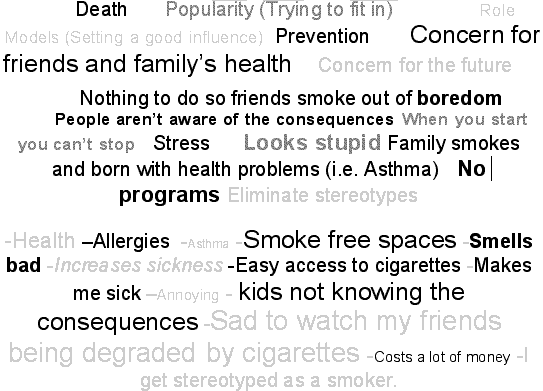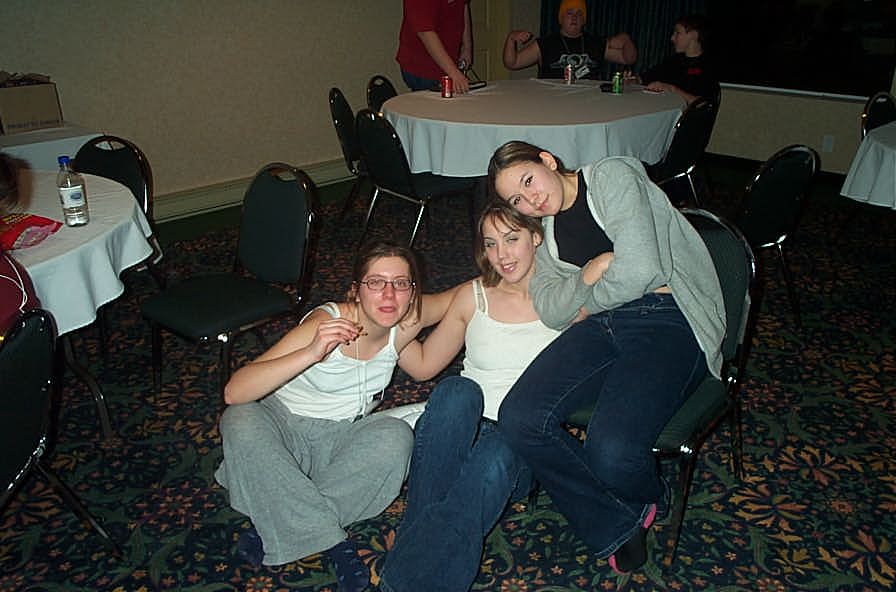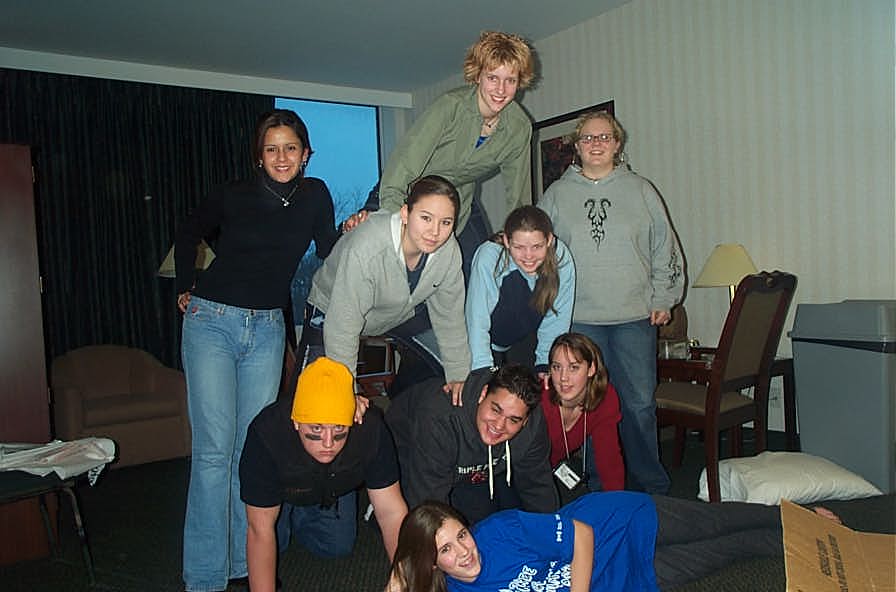

| We want to see more SMOKE FREE SPACES because then fewer children will be exposed to role models which influence them to start smoking. | Nous voudrions davantage d'ESPACES SANS FUMÉE pour réduire l'exposition des enfants aux images et aux modèles fumeurs, ce qui les influencent, à leur tour, de commencer à fumer. |
| We are concerned that
younger kids start smoking because they see: - smoking by parents and relatives in their homes - smoking by adults in our communities - smoking by older youth | Nous
nous inquiètons du nombre d'enfants qui commencent à fumer parce
qu'ils voient : - leurs parents et leur parenté qui fument chez eux - les adultes de leurs communautés qui fument - les jeunes plus âgés qui fument |
Why
is this an important issue to you? How does it affect you, your family, your community?
Pourquoi est-ce une question importante pour vous? Comment vous affecte-t-elle
et comment elle affecte vos familles et votre communauté?
Team 1 -
Smoking affects all people. Even if it is second hand. It can affect others' health. Why do people have to be around it if they don't choose to smoke? Our society has made it the smokers' choice and their descision how others people health is affected.
"Maybe its time for us to start taking action and doing something about it instead of just discussing it. Next time your in a public place think about the people around you smoking. Are you ready to accept the consequences because of their actions ? So if not lets take our own."
A child living in a home with smoking parents not only does not know their rights but may not have the courage to say anything about the situation.
Smoking affects everyone's health and smokers tend to be discriminated against. It is wrong for us to discriminate against people's race and gender but yet we have the right to discriminate against someone's habits. We should not be able to pick and choose someone else's lifestyle but the issue is society has forgotten that we should get to choose our own. With more smoke free spaces people would be forced to smoke less, which would cause a decrease in second hand smoke.
Since
schools are liable for a student crossing the street, schools allow smoking spots.
So perhaps we need to look at this and realize that the liability rules may be
unrealistic. If a school has the right to suspend a child for smoking on their
property why can a store owner or restaurant owner not also ask the child to leave.
By eliminating the access and area we can greatly reduce the amount of smoked
cigarettes.
Smoking is an addiction
and often starts out casually. Many people find it hard to moderate their smoking
which causes an extreme addiction. By reducing the amount of cigarettes in packs
we can help people become more casual smokers instead of addicted.
Smoking causes death, and illness. Maybe its time for us to start taking action and doing something about it instead of just discussing it. Next time you are in a public place think about the people around you smoking. Are you ready to accept the consequences because of their actions? So if not lets take our own.
Team 2 -
We need to fight the addiction and stop fighting the people addicted.
"People need to know the facts before they start smoking and not when the effects put them on their death beds."
In our surroundings, our homes, schools, and communities second hand smoke effects everyone. The smokers make their own choices, but they also need to know how their choices affect those around them and those who choose not to smoke.
Many loved ones are lost, and it affects us deeply because the losses are close to us. It also affects us more when someone close to us suffers. Charlene has lost family members to tobacco related illnesses. Many other members have had parents who once smoked or who still do smoke. Understanding why people smoke and how to build awareness is very important to this group.
It's important that we stay healthy so we are able to continue our daily activities.
Smoking kills so many people; however, it is legal and therefore a very difficult battle to fight. It is also an issue that costs the health care system a lot of money.
Team 3 -
It has become an accepted part of our school systems. Schools give students places to smoke. It is also a way for younger, or the less popular students to be accepted
"Little sisters and brothers look up to us. That's why I stopped and that's why it's important to me. My dad smokes two packs a day. My mom just started and she's 35-40. No smoking in the house. I don't want my brother and sister to see my parents smoking."
"It's important to me because I work with kids. When the parents come to pick up their kids and they're outside smoking, they need to realize that kids copy what their parents do. And I don't want to see the kids loose their parents."
"My dad has been smoking since he was 7. He was stressed because of smoking. My dad got a little violent because of stress. He was in the hospital for 6 months. And now has to use oxygen. Tried hypnoses didn't work very well"
Team 4 -

Team 5 -
OUR SMOKING STORIES...
Riyad
Non-smoker not overly bothered by smokers. In past, father was a smoker
but quit when he was a child. Found cigarettes in his father's car and believes
he still smokes. Girlfriend smoked socially and quit 2 months ago because it was
affecting her sports. Does not like when young women smoke or pregnant women.
Cory
Non-smoker
who is very sensitive to smoke. Experienced 2nd hand smoke as a child from grandparents.
Does not support places where children are exposed to smoke, especially in the
home.
Emily
Smoker. Grandparents and great-grandparents died of lung cancer caused by tobacco.
Both Parents smoke, mother smokes in the home. Smoked for 2 years now, started
at 14. Has 3 yr. Old brother who is exposed to ETS by mother who smokes in house.
Personally refrains from smoking in the house herself.
 Racean
Racean
Smoker. Parents smoked, had a big influence on her life. Has smoked for 6
years now and is affected in her sports, cannot play basketball and some other
sports anymore. Still plays Rugby. Reasoning behind smoking is that it allows
for a social circle of friends. Believes that smoking is a very social activity
and creates new friends, etc. President of SASS (Students Assisting Student Smokers)
Adrian
Smoker.
Quit exactly 1 year ago (today). Smoked for 4 years, started at 16. Believed that
smoking was the only thing in her life she could make a decision to do. Only way
to control something in her life. Quit smoking because it was the only way to
get control of her life (smoking made her lose control of her life). Quit by just
stopping one day, did not ease of.
Tony
Smoker. First tried cigarette at age 7. Started smoking at 13. Smoking
for 6 years now. Big influence to start smoking from family. Majority of people
in family smoke, including mother. Does not want to see nephews/nieces smoking.
Has baby boy on the way, starting to ease off on smoking. Does not want child
to be exposed to smoke. Does not like when younger people start to smoke in community.
Community has about 80% of people smoking
Louise
Non-smoker. Asmatic and athletic. Aunt died of lung cancer in early 40's.
Father smokes. She suffers in athletics because of ETS, poor breath and asthma.
Christa
Smoker. Started smoking at 13, influenced by parents and sister who smoked. First
tried smoking when saw sister smoking and asked what it tasted like, tried cigarette
from sister. Threw up and didn't like it. 2 months later tried it again and started
smoking since then. Has 5 yr old son now and smokes at home. Smoked when she was
pregnant. Does not like smoking around her son but cannot stop smoking. Does not
want her son to smoke so smokes in certain areas of the home. Does not want other
children to be exposed to smoking and does not want them to smoke either.
Jennifer
Smoker. Smoking for 9 years now. Mother smoked when she was pregnant,
Jen spent first 3 years of life in and out of hospital because of smoke from mother.
Did not like her parents smoking in the home and tried to stop them. Hated smoking
and stole parents cigarettes and sold it to other kids. Decided at 10 to Ôtry'
cigarette and got addicted after inhaling. Now addicted to cigarettes. Does not
like when younger children start smoking either, hates it. Does not want pregnant
women smoking or little children exposed to smoke. Works with troubled youth.
Thinks that youth 8-10yrs old should be targeted to prevent smoking. Believed
that children should be the target for non-smoking campaigns.
Where
do you see the problem most?
Où voyez-vous le problème davantage?
-
other youth - our peers - younger kids
- in our communities - adult role
models
- IN OUR HOMES - parents, relatives
- d'autres jeunes - nos amis
- dans nos communautés - des modèles
adultes
- DANS NOS MAISONS - nos parents, notre parenté
Team 1 -
Everywhere its peoples own descion to smoke or not to smoke. People need to be informed that either they have the right to ask a smoker to leave the room, or refrain from smoking, just as much as the smoker has the right to smoke.
The schools are the place where the younger people are most exposed to cigarettes.
Team 2-
-There is a lack of positive
role models for youth; the youth look up to those who are in their lives and if
the people around them smoke they have a bigger chance of starting themselves.
-The media has a strong influence the people and society. Some TV and movie
companies take tobacco companies' money and incorporate pro-tobacco messages even
if we don't always notice it. These messages are promoting smoking and tobacco
is good.
-The facts need to be taught to pregnant women.
-Youth centers
need to be used in better ways. They need to find ways to busy the youths and
keep them from only going there to use it as a warm and safe place to smoke.
-People make choices and some will make the choice to smoke; however, they are
not making the choices after knowing what it is doing to their bodies.
-
Young students are not informed about the effects and long term risks when they
begin to smoke.
-A lack of education and awareness is what is affecting the
people most negatively.
-Peer pressure needs to be used in a more positive
way to set a good example.
-If we want to make a difference we need to stop
preaching and start offering information and support.
-We live in a capitalist
society and money makes a difference, often times solutions need money to get
started; however, the groups do not have the money and can not tackle and compete
with tobacco companies who have an abundance of money.
-It is often difficult
to get smokers involved in building awareness.
-Smokers and former smokers
need to speak out; this will help get the attitude of "goody-goodies" preaching
their views.
Team 3 -
- High school, way
more smokers than non-smokers. If everyone is smoking I should just start. I'm
inhaling it anyway.
- In junior is when you try it, in high school is when
you get addicted.
- High school and at home, the kids look up to the youth
and parents.
- Good thing about what Ottawa has done with no smoking everywhere.

- In NS try to put smokes in liquor stores.
- The government should fund.
- The problem is junior high, it's not going to bug any one who smokes or
not. The big thing is peer pressure.
- I think the big problem is elementary.
A grade 5 girl who was smoking. The popular people who smoke kind of make other
people.
Team 4 -
-
Schools (young adult/kids)
- Uneducated smokers
- Front entrance of buildings